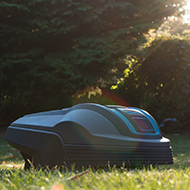
Threat has yet to be scientifically documented.
Hedgehog researcher Dr Sophie Lund Rasmussen is embarking on a project with the British Hedgehog Preservation Society (BHPS) to find out whether robotic lawnmowers are harmful to hedgehogs.
Robotic lawnmowers running at night have been declared a great threat to European hedgehog populations. However, the threat has yet to be scientifically documented.
Dr Rasmussen, from Aalborg University, Denmark, aims to find out if there is any truth to the claim that robotic lawn mowers kill hedgehogs, or if there is an alternative explanation for the injuries.
In the study, she will place dead hedgehogs in front of approaching robotic lawnmowers and record exactly how the machines react to the hedgehogs – i.e. will they stop and change direction, as they are supposed to. The dead hedgehogs will be obtained from hedgehog rehabilitation centres, where they were sadly too poorly to save.
“It is important to discover and document what is causing the horrific injuries we see on hedgehogs every year so that we can improve the conservation initiatives directed at this declining species,” said Dr Rasmussen. “If my research shows that the robotic lawn mowers are not the cause, it is important to shift people’s focus to the real source of the problem to best protect the hedgehogs.”
Dr Rasmussen also aims to find out if it is only special types of robotic lawnmowers with specific features that are causing the injuries, and, for example, if only smaller, juvenile hedgehogs are in danger of being injured or killed by the machines.
Based on the results of her study, Dr Rasmussen will collaborate with the producers of robotic lawnmowers to develop more hedgehog-friendly models.
Fay Vass, chief executive of the BHPS who is funding the project, commented: “This is important work, we need to find out if these mowers are in fact harmful to hedgehogs. If so we can offer advice to industry and to the public on how best to help hedgehogs when caring for the lawn. “
She added: “If these devices are of no threat, we can focus our efforts elsewhere. We would hasten to add of course no live hedgehogs will be in danger from this study.”



 The latest
The latest